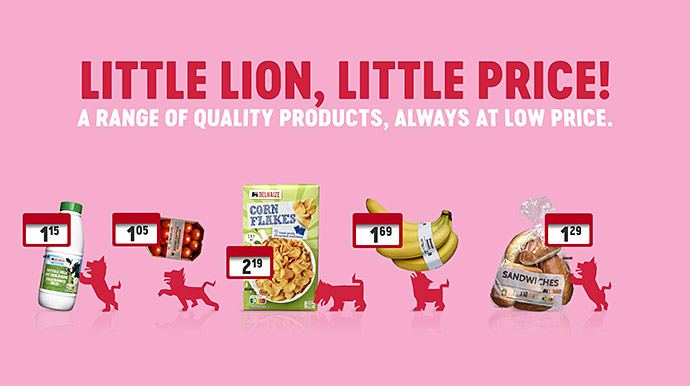1. market situation
2022 has been a year of brutal inflation, reaching a staggering record of 10,3%. Statbel noted that the inflation on groceries has never been as high as it was in 2022. It's no surprise that this had a major impact on people's purchasing power. Hard discounters Aldi and Lidl won market share while Delhaize took the punches. In the first quarter of 2022, Delhaize was hit by a twofold blow: it had a decrease in store visits and a decrease of average ticket value despite an increase in price per item. The total market declined whilst there was a natural shift to hard discounters, with Aldi as the big winner.
For Delhaize customers, price has never been the reason to come, but it's the first reason to leave. But falling in the discounter trap and randomly lowering prices has proven to be a bad marketing strategy for Delhaize. We learned that lesson the hard way during the financial crisis of 2008.
To get Delhaize back in consumer's hearts, minds, and wallets, we needed to offer a new affordability solution on every day, highly penetrated qualitative products. The real challenge was to integrate this affordability proposition at the heart of the Delhaize brand without destroying its image as the quality food retailer.
Finding this affordability proposition became even more important when we investigated the audience's attitude towards grocery shopping. More than half of all Belgians (54%) said they were buying less A-brands, shopping smaller baskets, and buying more discounts. For the first time since long, price-oriented shopping has overtaken quality-oriented shopping. Our main targets love Delhaize's quality but were suddenly willing to downgrade and buy basic daily products from discounters - which certainly was the case for families with kids. For them, Delhaize was risking becoming a top-up shop. As Delhaize's CEO stated: 'we can't stand indifferently because many of our clients will resort to inferior and less healthy products'.
|









 Na haar studies vertaler/tolk & marketing communicatie aan de Erasmushogeschool startte Isabel haar reclameloopbaan in 2003 bij DDB. Daarna volgende LG&F/Famous, Mortierbrigade en ten slotte 8 jaar bij TBWA. Zij werkte voor klanten als Nationale Loterij, Bacardi, AXA, Deutsche Bank en ten slotte als Client Service Director jaren voor Telenet. In 2019 stapte ze over naar de 'andere kant' bij Delhaize.
Na haar studies vertaler/tolk & marketing communicatie aan de Erasmushogeschool startte Isabel haar reclameloopbaan in 2003 bij DDB. Daarna volgende LG&F/Famous, Mortierbrigade en ten slotte 8 jaar bij TBWA. Zij werkte voor klanten als Nationale Loterij, Bacardi, AXA, Deutsche Bank en ten slotte als Client Service Director jaren voor Telenet. In 2019 stapte ze over naar de 'andere kant' bij Delhaize. Na haar studies in de Taal- en Letterkunde startte Dorien haar reclameloopbaan in 2014. Als stratege heeft ze een ongewoon grote liefde voor creativiteit, zowel in haar werk als in haar persoonlijk leven. Haar nieuwsgierigheid naar reclame bracht haar naar mortierbrigade, waar ze op heel wat spraakmakende en bekroonde campagnes voor onder andere ING, Mobile Vikings, DreamLand, Canvas en De Morgen heeft gewerkt. In 2020 begon ze aan een nieuw hoofdstuk bij TBWA waar ze als strategic director verantwoordelijk is voor onder andere Delhaize, ING, Van Marcke en Lindemans.
Na haar studies in de Taal- en Letterkunde startte Dorien haar reclameloopbaan in 2014. Als stratege heeft ze een ongewoon grote liefde voor creativiteit, zowel in haar werk als in haar persoonlijk leven. Haar nieuwsgierigheid naar reclame bracht haar naar mortierbrigade, waar ze op heel wat spraakmakende en bekroonde campagnes voor onder andere ING, Mobile Vikings, DreamLand, Canvas en De Morgen heeft gewerkt. In 2020 begon ze aan een nieuw hoofdstuk bij TBWA waar ze als strategic director verantwoordelijk is voor onder andere Delhaize, ING, Van Marcke en Lindemans.